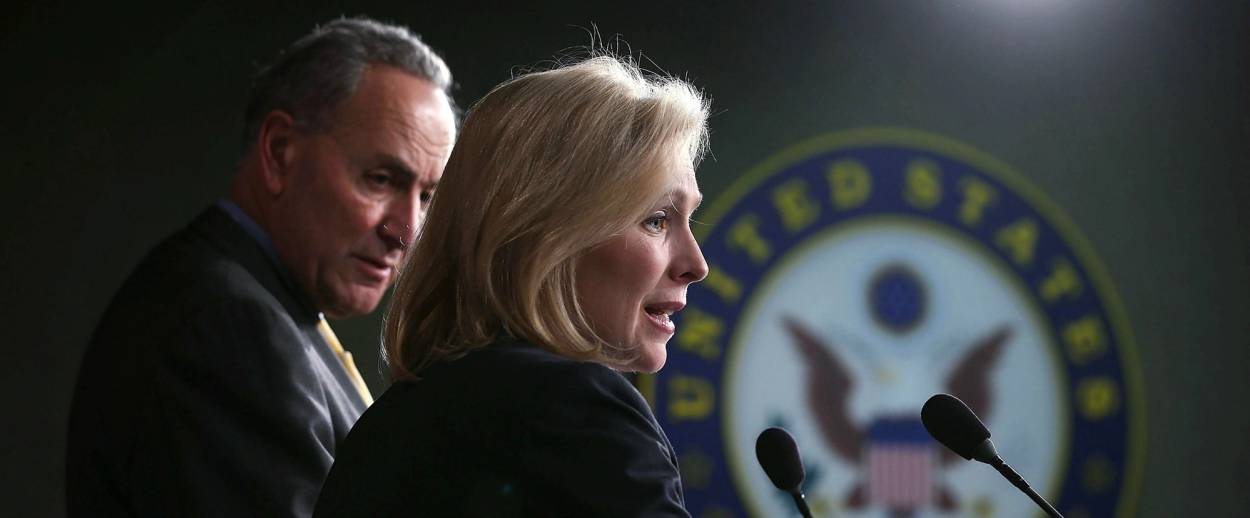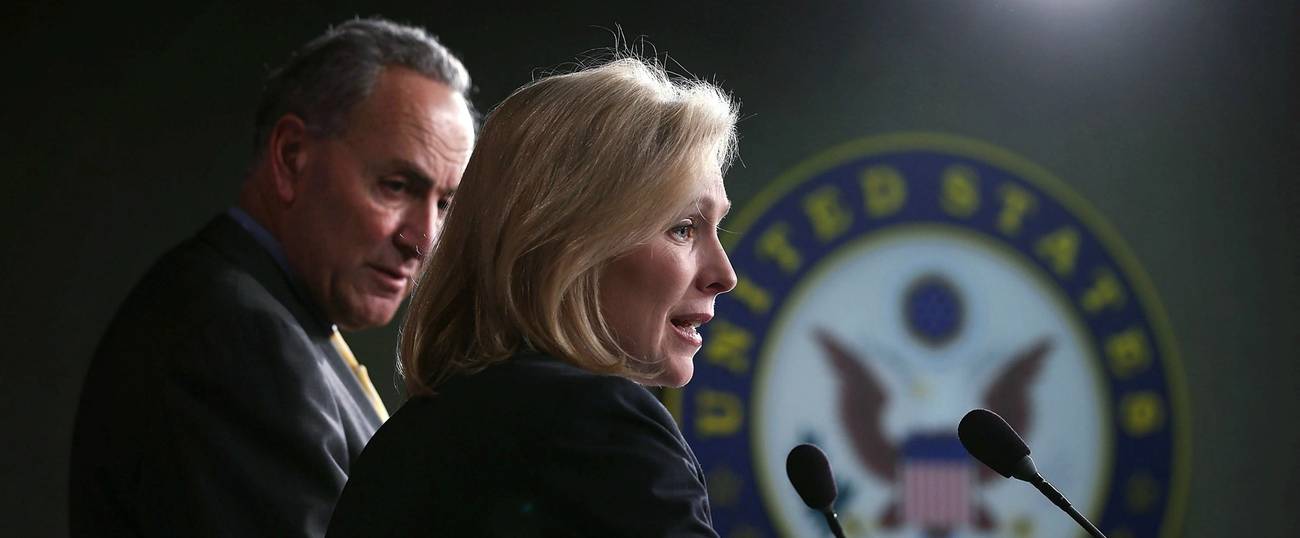Gillibrand and Booker Know Something We Don’t
The previously reliably pro-Israel senators have officially changed course, and it’s worth asking why




On Monday, Senator Kristin Gillibrand attended a town hall meeting in Queens, and announced that she was withdrawing her support from an anti-BDS bill. The move came after the senator met with the ACLU, which argues that the bill will stifle the First Amendment. It won’t: as its co-sponsors, Senators Cardin and Portman, explained in a letter to the civil liberties organization last month, the new legislative initiative merely amends a 1977 act that prohibits Americans from complying with unauthorized foreign boycotts—think the Arab League’s long-standing anti-Israel drive—and expands it to include boycotts sanctioned not only by foreign governments but by international governmental organizations as well. In other words, the bill is an important but relatively minor addition to a law that has been on the books for four decades and was consistently upheld by the courts. Why, then, did Gillibrand change her mind?
I’ve placed a call to her press representatives, who directed me to her town hall comments. There, the senator said that while she did not agree with the ACLU interpretation, she believed that the group came by it honestly, and was concerned that others may have the same interpretation and erroneously believe that the new bill applies to individuals as well as companies, which it clearly does not.
Stop and think about this one: here’s a United States senator saying that because she’s concerned that some people might perceive a bill in pretty much the opposite way than its language clearly states, she will not be supporting it. Bills, of course, are open to debate and subject to interpretation, but this is why we have the courts, and the Constitution, the former entrusted with upholding the latter. To walk away from a bill because some people somewhere may at some point misunderstand it is not only politically opportunistic, but an invitation to future mob rule.
Not to be outdone by the Democratic senator from New York, the Democratic senator from New Jersey, Cory Booker, voted, on Thursday, against the Taylor Force Act, a bill that would cut off American financial aid to the Palestinian Authority so long as Mahmoud Abbas and his goons continue to pay big bucks to terrorists and their families. The bill eventually passed the Senate’s Foreign Relations Committee with a 16-5 vote, which means enough Democrats were convinced by the simple moral proposition that it’s probably a very bad idea to send taxpayer dollars to people who then use them to incentivize the murder of Jews.
Why did the senator vote nay? Again, blame the “unintended hypothetical consequences” defense: “While Senator Booker supports the stated goal of this bill,” wrote his spokeswoman, “the legislation as written could have drastic unintended consequences in a volatile region, and actually make the security situation even worse.” It’s a shame that the senator didn’t apply the same logic before endorsing the Iran deal; a bit of skepticism about whether handing hundreds of millions of dollars to the world’s premiere exporter of terrorism, anti-Semitism, and Holocaust-denial would’ve gone a long way.
So what’s going on here? Nothing good. As Seth Mandel, an editor with The New York Post, noted on Twitter the other day, these recent developments should be particularly worrisome to Jews because Booker isn’t an ideologue but a weathervane adept at determining which way the political winds are blowing. And for the Democrats, they’re blowing away from the Jews.
You can hardly blame the senators for thinking this way. When the largest progressive grassroots movement in years is led by a proud anti-Jewish bigot; when marches waving the flags of civil rights and equality ban the Star of David; when the media, academia, and human rights organizations are quick to single out Israel for opprobrium—in short, when the whole political bloc drifts leftward, a politician would have to be either very courageous or very foolish not to follow it.
Especially when so many Jewish institutions, lamentably, drift right along. AIPAC, for example, having failed miserably to stop the Iran deal, invests millions of dollars in reaching out to progressives, thereby violating the first principle of effective lobbying, namely the edict to always embrace your friends and fight your enemies. The ADL, which is busy churning out warnings against members of the alt-right, the alt-light and others right-wing operators, bothered commenting on the Taylor Force Act in passing, the organization’s first public mention of the legislation. And the Forward, until some years ago a respectable mainstream Jewish publication, just published a list of people who are a threat to the Jews, which includes, side by side, President Trump and the leaders of Hamas and Hezbollah.
This is what ideological madness looks like, and, sadly, its infecting even politicians who used to be reliable and reasonable representatives of American Jewish interests. Given the way things are going, it’s hard to see the Democratic party being the natural political home of American Jews for much longer.
Liel Leibovitz is editor-at-large for Tablet Magazine and a host of its weekly culture podcast Unorthodox and daily Talmud podcast Take One. He is the editor of Zionism: The Tablet Guide.